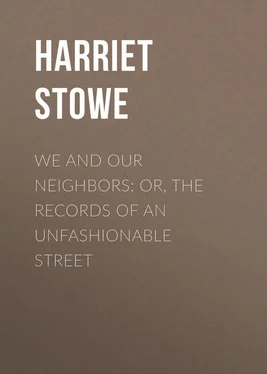Harriet Stowe - We and Our Neighbors - or, The Records of an Unfashionable Street
Здесь есть возможность читать онлайн «Harriet Stowe - We and Our Neighbors - or, The Records of an Unfashionable Street» — ознакомительный отрывок электронной книги совершенно бесплатно, а после прочтения отрывка купить полную версию. В некоторых случаях можно слушать аудио, скачать через торрент в формате fb2 и присутствует краткое содержание. ISBN: , Жанр: foreign_prose, на английском языке. Описание произведения, (предисловие) а так же отзывы посетителей доступны на портале библиотеки ЛибКат.
- Название:We and Our Neighbors: or, The Records of an Unfashionable Street
- Автор:
- Жанр:
- Год:неизвестен
- ISBN:http://www.gutenberg.org/ebooks/48603
- Рейтинг книги:4 / 5. Голосов: 1
-
Избранное:Добавить в избранное
- Отзывы:
-
Ваша оценка:
- 80
- 1
- 2
- 3
- 4
- 5
We and Our Neighbors: or, The Records of an Unfashionable Street: краткое содержание, описание и аннотация
Предлагаем к чтению аннотацию, описание, краткое содержание или предисловие (зависит от того, что написал сам автор книги «We and Our Neighbors: or, The Records of an Unfashionable Street»). Если вы не нашли необходимую информацию о книге — напишите в комментариях, мы постараемся отыскать её.
We and Our Neighbors: or, The Records of an Unfashionable Street — читать онлайн ознакомительный отрывок
Ниже представлен текст книги, разбитый по страницам. Система сохранения места последней прочитанной страницы, позволяет с удобством читать онлайн бесплатно книгу «We and Our Neighbors: or, The Records of an Unfashionable Street», без необходимости каждый раз заново искать на чём Вы остановились. Поставьте закладку, и сможете в любой момент перейти на страницу, на которой закончили чтение.
Интервал:
Закладка:
Now it happened that adjoining the parlor where this conversation had taken place was a little writing-cabinet which Mr. Van Arsdel often used for the purposes of letter-writing. On this morning, when his wife supposed him out as usual at his office, he had retired there to attend to some correspondence. The entrance was concealed by drapery, and so he had been an unintentional and unsuspected but much amused listener to Aunt Maria's adjurations to his wife on his behalf.
All through his subsequent labors of the pen, he might have been observed to pause from time to time and laugh to himself. The idea of lying as a quiet dead weight on the wheels of the progress of his energetic relation was something vastly pleasing to the dry and secretive turn of his humor – and he rather liked it than otherwise.
"We shall see whether I am losing my faculties," he said to himself, as he gathered up his letters and departed.
CHAPTER IV
EVA HENDERSON TO HARRY'S MOTHER
My Dear Mother: Harry says I must do all the writing to you and keep you advised of all our affairs, because he is so driven with his editing and proofreading that letter-writing is often the most fatiguing thing he can do. It is like trying to run after one has become quite out of breath.
The fact is, dear mother, the demands of this New York newspaper life are terribly exhausting. It's a sort of red-hot atmosphere of hurry and competition. Magazines and newspapers jostle each other, and run races, neck and neck, and everybody connected with them is kept up to the very top of his speed, or he is thrown out of the course. You see, Bolton and Harry have between them the oversight of three papers – a monthly magazine for the grown folk, another for the children, and a weekly paper. Of course there are sub-editors, but they have the general responsibility, and so you see they are on the qui vive all the time to keep up; for there are other papers and magazines running against them, and the price of success seems to be eternal vigilance. What is exacted of an editor now-a-days seems to be a sort of general omniscience. He must keep the run of everything, – politics, science, religion, art, agriculture, general literature; the world is alive and moving everywhere, and he must know just what's going on and be able to have an opinion ready made and ready to go to press at any moment. He must tell to a T just what they are doing in Ashantee and Dahomey, and what they don't do and ought to do in New York. He must be wise and instructive about currency and taxes and tariffs, and able to guide Congress; and then he must take care of the Church, – know just what the Old Catholics are up to, the last new kink of the Ritualists, and the right and wrong of all the free fights in the different denominations. It really makes my little head spin just to hear what they are getting up articles about. Bolton and Harry are kept on the chase, looking up men whose specialties lie in these lines to write for them. They have now in tow a Jewish Rabbi, who is going to do something about the Talmud, or Targums, or something of that sort; and a returned missionary from the Gaboon River, who entertained Du Chaillu and can speak authentically about the gorilla; and a lively young doctor who is devoting his life to the study of the brain and nervous system. Then there are all sorts of writing men and women sending pecks and bushels of articles to be printed, and getting furious if they are not printed, though the greater part of them are such hopeless trash that you only need to read four lines to know that they are good for nothing; but they all expect them to be re-mailed with explanations and criticisms, and the ladies sometimes write letters of wrath to Harry that are perfectly fearful.
Altogether there is a good deal of an imbroglio, and you see with it all how he comes to be glad that I have a turn for letter-writing and can keep you informed of how we of the interior go on. My business in it all is to keep a quiet, peaceable, restful home, where he shall always have the enjoyment of seeing beautiful things and find everything going on nicely without having to think why, or how, or wherefore; and, besides this, to do every little odd and end for him that he is too tired or too busy to do; in short, I suppose some of the ambitious lady leaders of our time would call it playing second fiddle. Yes, that is it; but there must be second fiddles in an orchestra, and it's fortunate that I have precisely the talent for playing one, and my doctrine is that the second fiddle well played is quite as good as the first. What would the first be without it?
After all, in this great fuss about the men's sphere and the women's, isn't the women's ordinary work just as important and great in its way? For, you see, it's what the men with all their greatness can't do, for the life of them. I can go a good deal further in Harry's sphere than he can in mine. I can judge about the merits of a translation from the French, or criticise an article or story, a great deal better than he can settle the difference between the effect of tucking and inserting in a dress, or of cherry and solferino in curtains. Harry appreciates a room prettily got up as well as any man, but how to get it up – all the shades of color and niceties of arrangement, the thousand little differences and agreements that go to it – he can't comprehend. So this man and woman question is just like the quarrel between the mountain and the squirrel in Emerson's poem, where "Bun" talks to the mountain:
"If I am not so big as you,
You're not so small as I,
And not half so spry.
If I cannot carry forests on my back,
Neither can you crack a nut."
I am quite satisfied that, first and last, I shall crack a good many nuts for Harry. Not that I am satisfied with a mere culinary or housekeeping excellence, or even an artistic and poetic skill in making home lovely; I do want a sense of something noble and sacred in life – something to satisfy a certain feeling of the heroic that always made me unhappy and disgusted with my aimless fashionable girl career. I always sympathized with Ida, and admired her because she had force enough to do something that she thought was going to make the world better. It is better to try and fail with such a purpose as hers than never to try at all; and in that point of view I sympathize with the whole woman movement, though I see no place for myself in it. But my religion, poor as it is, has always given this excitement to me: I never could see how one could profess to be a Christian at all and not live a heroic life – though I know I never have. When I hear in church of the "glorious company of the apostles," the "goodly fellowship of the prophets," the "noble army of martyrs," I have often such an uplift – and the tears come to my eyes, and then my life seems so poor and petty, so frittered away in trifles. Then the communion service of our church always impresses me as something so serious, so profound, that I have wondered how I dared go through with it; and it always made me melancholy and dissatisfied with myself. To offer one's soul and body and spirit to God a living sacrifice surely ought to mean something that should make one's life noble and heroic, yet somehow it didn't do so with mine.
It was one thing that drew me to Harry, that he seemed to me an earnest, religious man, and I told him when we were first engaged that he must be my guide; but he said no, we must go hand in hand, and guide each other, and together we would try to find the better way. Harry is very good to me in being willing to go with me to my church. I told him I was weak in religion at any rate, and all my associations with good and holy things were with my church, and I really felt afraid to trust myself without them. I have tried going to his sort of services with him, but these extemporaneous prayers don't often help me. I find myself weighing and considering in my own mind whether that is what I really do feel or ask; and if one is judging or deciding one can't be praying at the same time. Now and then I hear a good man who so wraps me up in his sympathies, and breathes such a spirit of prayer as carries me without effort, and that is lovely; but it is so rare a gift! In general I long for the dear old prayers of my church, where my poor little naughty heart has learned the way and can go on with full consent without stopping to think.
Читать дальшеИнтервал:
Закладка:
Похожие книги на «We and Our Neighbors: or, The Records of an Unfashionable Street»
Представляем Вашему вниманию похожие книги на «We and Our Neighbors: or, The Records of an Unfashionable Street» списком для выбора. Мы отобрали схожую по названию и смыслу литературу в надежде предоставить читателям больше вариантов отыскать новые, интересные, ещё непрочитанные произведения.
Обсуждение, отзывы о книге «We and Our Neighbors: or, The Records of an Unfashionable Street» и просто собственные мнения читателей. Оставьте ваши комментарии, напишите, что Вы думаете о произведении, его смысле или главных героях. Укажите что конкретно понравилось, а что нет, и почему Вы так считаете.












